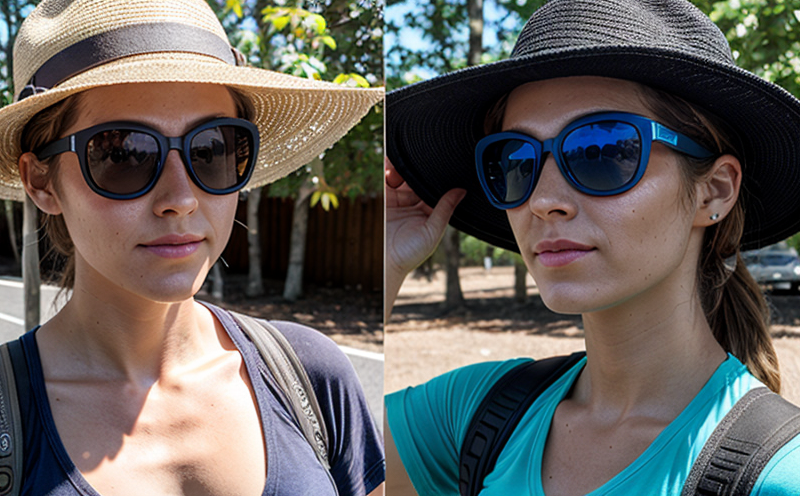Testing of outdoor furniture fabrics against UV degradation
The durability and longevity of outdoor furniture fabrics are critical considerations in many sectors, including residential, commercial, and industrial applications. Exposure to ultraviolet (UV) light can lead to significant deterioration, reducing the aesthetic appeal and functional integrity of these materials over time. Understanding how different textile products withstand such exposure is essential for manufacturers aiming to produce high-quality, long-lasting outdoor furniture.
The primary focus here is on testing fabrics used in outdoor furniture against UV degradation. This involves simulating real-world conditions using accelerated aging techniques that mimic the effects of prolonged sunlight exposure. The goal is to assess the resistance of these textiles to photodegradation and other physical changes resulting from UV radiation. By subjecting samples to controlled environments, we can accurately predict their performance under actual outdoor usage.
Our testing methodology follows international standards such as ISO 105-B02 for artificial light sources or ASTM D7923-18 for solar simulators. These protocols ensure consistent and reliable results across various fabrics and materials. We also employ advanced analytical tools like spectrophotometers to measure colorfastness changes, ensuring precise quantification of any alterations in appearance due to UV exposure.
In addition to assessing visual aspects, our tests evaluate mechanical properties such as tensile strength and tear resistance before and after simulated UV aging. This helps determine whether the material maintains its structural integrity during prolonged outdoor use. Furthermore, we analyze chemical composition shifts that might indicate potential hazards or health risks associated with photodegradation byproducts.
For quality managers, compliance officers, R&D engineers, and procurement specialists involved in developing or sourcing fabrics for outdoor furniture, this service provides invaluable insights into material durability and performance under expected environmental stressors. It allows them to make informed decisions about fabric selection based on empirical evidence rather than speculation or guesswork.
Understanding the impact of UV degradation is crucial not only from a quality perspective but also environmentally speaking. By selecting fabrics that demonstrate strong resistance to photodegradation, manufacturers can contribute positively towards sustainable design practices and reduce waste associated with premature material failure.
- Reduction in raw material usage: Longer-lasting fabrics mean less frequent replacement, leading to lower production demands.
- Emission reductions: Less fabric waste translates into reduced carbon footprint from manufacturing processes.
- Resource conservation: Sustainable practices foster better resource management throughout the supply chain.
- Consumer satisfaction: Products that last longer and retain their appearance and functionality are more likely to meet consumer expectations, enhancing brand loyalty.
In summary, our UV protection testing service equips stakeholders with comprehensive data about fabric performance under simulated UV conditions. This information is vital for ensuring product quality while promoting environmentally responsible practices within the industry.
Applied Standards
The testing of outdoor furniture fabrics against UV degradation adheres to several internationally recognized standards designed to ensure accuracy and consistency in evaluating material properties under specific environmental stressors. Among these are:
- ISO 105-B02:2006 – This standard specifies the use of xenon arc lamps as an artificial light source for accelerated weathering tests on materials.
- ASTM D7923-18 – This document outlines procedures for using solar simulators to test textiles' resistance to ultraviolet radiation.
- EN 16994:2015 – European standard providing guidelines on the use of outdoor furniture with respect to UV protection and light transmission characteristics.
These standards provide a framework for conducting tests that simulate real-world conditions, allowing manufacturers to compare results fairly across different products. Compliance with these norms ensures that our testing methodologies align closely with industry best practices, thereby enhancing credibility and reliability of findings.
Industry Applications
The demand for durable outdoor furniture continues to grow as more people spend time enjoying the outdoors year-round. This trend has fueled significant advancements in textile technology aimed at improving both aesthetic appeal and functional durability. Our UV protection testing service plays a pivotal role in supporting this innovation by providing detailed insights into material performance under prolonged exposure to sunlight.
Outdoor seating, such as chairs, sofas, and tables, requires fabrics capable of enduring harsh weather conditions while maintaining their colorfastness and texture integrity. By undergoing rigorous UV degradation tests according to established protocols like ISO 105-B02 or ASTM D7923-18, manufacturers can ensure that their products meet stringent quality benchmarks.
Similarly, awnings, parasols, and other shading solutions benefit greatly from robust UV protection testing. These items must not only block direct sunlight effectively but also retain their structural integrity over extended periods. Our testing ensures that these textiles maintain their performance standards despite continuous exposure to ultraviolet rays.
The automotive industry is another significant beneficiary of our UV protection testing service, especially for components like bumpers, grilles, and other exterior parts made from thermoplastic materials. These elements are highly susceptible to photodegradation, which can compromise vehicle aesthetics and safety features over time. By leveraging our expertise in simulating real-world conditions through accelerated aging techniques, automotive manufacturers gain valuable data on material stability.
In summary, whether it's for outdoor furniture or automotive applications, our UV protection testing service provides critical information necessary for enhancing product quality and durability while adhering to international standards.





